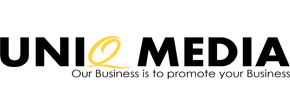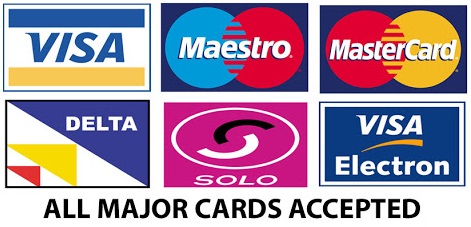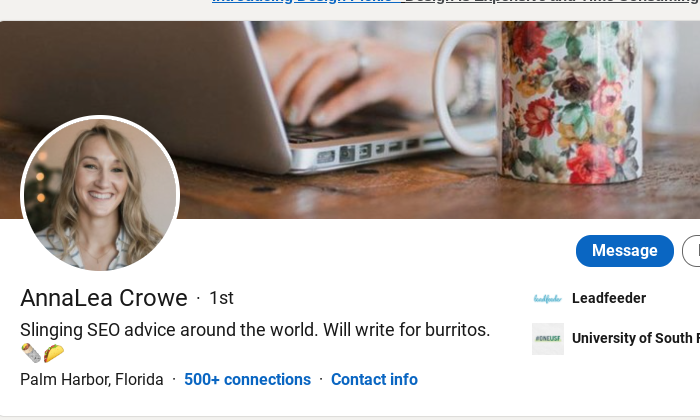
LinkedIn’s 690 million members include 180 million senior-level influencers, 63 million decision-makers and 10 million C-level executives.
Hence, there are a lot of influential people on LinkedIn that have hiring power and purchase power. Whatever you hope to achieve from using the network, you’ll want to make a good impression.
Your headline is the first thing that people see aside from your profile picture. It’s how decision-makers will find you. It’s how you get people to notice you and what will make them want to visit your profile to learn more. Thus, it’s safe to say your headline is pretty important.
So, I thought I’d share my top tips for creating an effective headline with you. But, first, let’s look at the basics:
What is Your LinkedIn Headline?
Your headline is the tagline that appears under your name on LinkedIn and at the top of your profile page. The headline used to be limited to 120 characters. But, here’s some good news, LinkedIn extended the headline to 220 characters in 2020. So, you have a little more space to sell yourself, share your vision or whatever it is you’d like to express via your headline.
What Makes a Winning LinkedIn Headline
There are some important criteria for creating an impactful headline. The best LinkedIn headlines do the following:
Make Use of Keywords
Keywords aren’t the only thing your headline should include. But they are key to helping the right people find your profile. Keywords can include your job title, skills and areas you specialize in. Place keywords towards the beginning of your headline and then expand with further information.
Express Your Value
Expressing you or your company’s value means sharing more than the tasks you carry out. Your headline should be driven by the benefits of the services you provide and the kind of results you achieve. For example, rather than saying you do tax planning, you’d say you help businesses to save money.
Are Unique
A winning LinkedIn headline is one that stands out from the crowd. Think about how many people do the exact same job as you or offer similar services. You can give yourself a competitive edge and encourage more people to visit your profile by making your headline different.
Help You Meet Your Goals
You need to think carefully about why you’re on LinkedIn and what you hope to achieve. This should inform what you include in your headline (and the rest of your profile). If you’re not sure about what you can accomplish on LinkedIn or how to go about it, you may wish to speak with a social media consultant.
Now let’s look in more detail at exactly how you can create a winning headline:
1. Get Inspiration
By default, LinkedIn uses your job title and employer as your headline. What a snooze fest. If you want to do better, the first step is to get inspired.
Search for people in your field or who have similar roles to you. Take a look at how they’ve formulated their headlines. See what appeals to you and what doesn’t. Of course, you shouldn’t just nab somebody else’s headline. But, doing this will help you come up with ideas for how you want your headline to appear.
Also, pay attention to those who appear at the top of the search results for your industry. What keywords do they use? Note these keywords as they likely contribute to why these pros are doing so well in the search results.
2. Ask Yourself These Questions
When you decide to upgrade your LinkedIn headline to maximize its impact, it’s a good idea to have a little brainstorming sesh. Here are some questions that will guide you when you’re coming up with ideas:
- How would you describe yourself to a new colleague if you only had five seconds?
- What makes you different from others with the same job title?
- Why should users click on your profile?
- What are your most in-demand skills?
- What are your biggest accomplishments?
- What makes you unique?
3. Choose the Right Keywords
Include relevant keywords in your headline so that you appear in more search results.
To do this, you’ll first need to think about who you want to find your profile on LinkedIn. A recruiter? A potential lead? Influencers you hope to connect with? And so on…
This will guide you in figuring out the right keywords to use. For example, you may include your specific skills or specialisms to get found by recruiters with the most relevant job opportunities.
In this example, we don’t just have a “developer”, nor do we just have a “chatbot developer”, the user goes even more specific with the terms “Facebook Messenger Marketing” and “Automation Practitioner”:
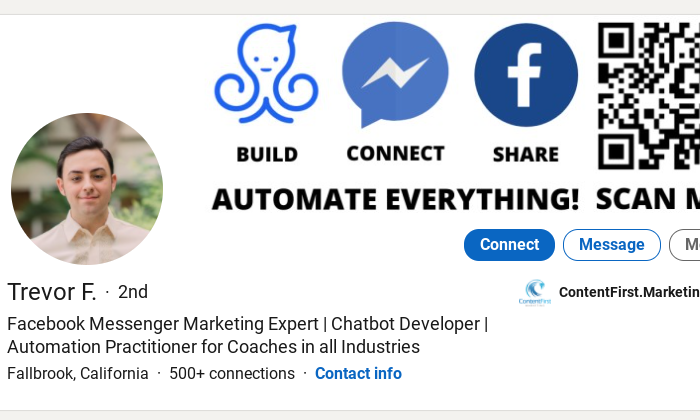
Whereas, if you’re using LinkedIn to network and boost your authority, you may want to use broader terms. Your job role might be “Artworker” but in order to be found by more people, it’d be a very good idea to include the term “Graphic Design”.
4. Include Your Unique Selling Proposition
Keywords alone aren’t enticing enough to get users to visit your profile. State the value that you provide by doing what you do, in particular something that makes you stand out from the crowd.
There’s a simple formula you can use to express this: I help X do Y by doing Z. Here’s an example from an accounting consultant:
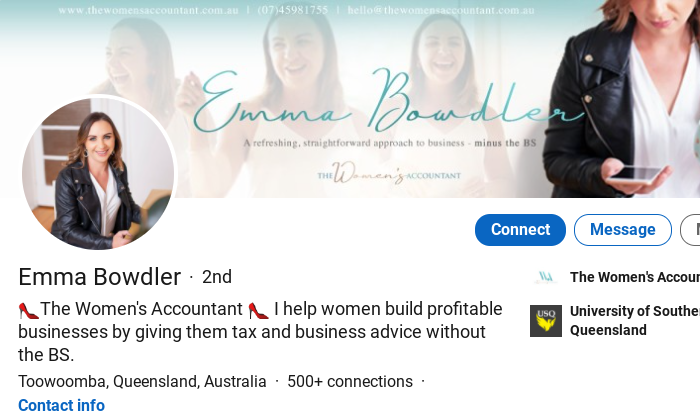
When she says “I help women build profitable businesses”, she outlines the beneficial results of her work, not just the tasks that she performs. You should do something similar.
You can also use data to drive your point home. Here an email marketer shares the average results he achieves:

There are tons of relevant data points you could include to prove your value, such as the number of customers you’ve helped achieve a particular outcome or the results of an impressive case study.
5. Share Your Achievements/Credentials
When you make self-aggrandizing claims on LinkedIn, people will either think you’re arrogant or full of it. Instead, you should go by the old adage, “Show don’t tell”. Show that you’re great at what you do via your achievements or credentials.
What’s your most impressive achievement? Have you won an award perhaps? Been featured on top media outlets? Sold a bunch of books? Grew a well-known company? Those are the kind of things you’ll want to share.
This professional shares the fact that he’s been a LinkedIn Top Voice honoree four times and sprinkles in some serious social proof by mentioning his work with Mark Cuban:

Furthermore, certain credentials that are recognized by people in your industry will give you clout. For example, in the marketing world it’s good to be Google-certified, like this pro:

Share credentials relevant to your position to show that you’re not just messing around, you really know what you’re doing.
6. Use Natural Language
Keep your headline free of jargon, particularly if you’re using LinkedIn for sales or lead generation. If a prospect doesn’t understand what you’re selling, you won’t have much luck.
Similarly, make your job title clear and simple unless you’re seeking a specific job role. Again, users you want to connect with may not understand what you do. Even if you think the term “Business Development Manager” is clear, trust me, simplifying it to “Sales Manager” is much more transparent.
Also, avoid buzzwords. After a time, every Tom, Dick and Harry will be using the same trendy terminology to describe their services. Thus, your words become meaningless.
And saying that you’re a “Guru”, “Ninja” or “Wizard” is a bit cheesy and old-fashioned. It won’t help you in the search results either. When was the last time you searched for a ninja on LinkedIn or anywhere for that matter?
Try to use simple, everyday language to explain your role or value proposition. Here’s an excellent example from a marketing professional:

Her target audience, small businesses, may not be familiar with or fully understand industry terms so she offers a straightforward, benefit-driven value proposition.
7. Don’t Put “Unemployed”
Even if you’re currently looking for a job, you shouldn’t put “Unemployed”, “Seeking New Opportunities” or similar in your headline.
The thing is, recruiters or companies aren’t searching for the term “Unemployed” on LinkedIn. You only get a couple hundred characters for your headline, so it would be better to utilize that space for keywords that they are likely to search for, and your experience, specialisms, credentials etc.
You can show that you’re looking for work on your profile instead. At the top of your profile, you’ll see a section that says, “Show recruiters you’re open to work”.
Simply, fill in details about the type of role you’re looking for and the location. You can even change the settings so that your current employers won’t see that you’re seeking work.
8. Share Your Mission
Maybe you’re not looking to promote yourself. Perhaps, you’re in the process of growing a startup or maybe you or your company are trying to achieve a wider goal that you want people to know about.
If this sounds like you, then you should definitely share your vision in your headline. In this example, the professional shares what he does “mass transit” but also why he does it “to reduce our carbon footprint and create a more connected community”:
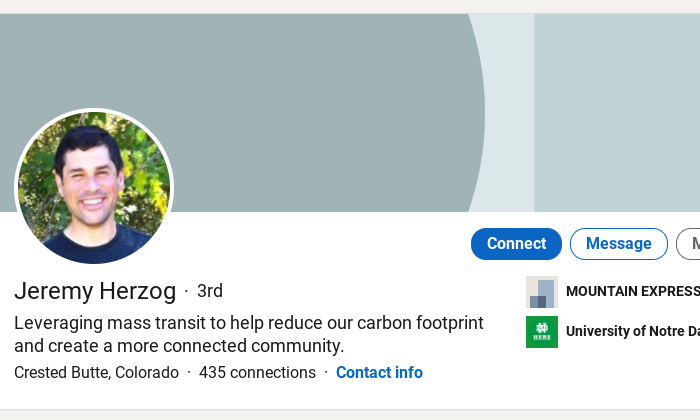
You could use a similar formula. Start with the what and then go into the why. If you’re unsure about how to phrase your goals, you can always take inspiration from your company’s mission statement.
9. Show Your Personality
Like with any other social media platform, users skim through their LinkedIn feed, groups and even search results at speed. So, you need a headline that’s going to make somebody stop and take notice.
Get creative and use your headline to express your personality. Not only will it make you stand out but it’ll also make your profile memorable.
Here’s an example from an SEO manager with a quirky sense of humor:

Don’t worry, though. You don’t have to be the Kevin Hart of LinkedIn. There are other ways to express your personality via your headline. Perhaps, you want to project positive vibes or enthusiasm.
You could even share a little personal tidbit about yourself. Maybe you do PR during the day and rule at Settlers of Catan by night… This kind of thing will also help start conversations between you and new connections.
10. Keep Your Headline Updated
It’s easy to set and forget your headline. But to get the most from it you need to keep it up to date.
Firstly, be sure to add new skills, achievements, career developments and so on when they arise. Your skillset will develop over time and your headline should reflect this.
Moreover, you may wish to test the impact of your headline and update it accordingly. When you make an alteration, keep an eye on the number of people who have viewed your profile.
With LinkedIn Premium, you can also see who has viewed your profile. Therefore, you can discover if your headline is attracting who you want to attract or your target audience.
Conclusion
You can use your LinkedIn headline to get noticed by influential professionals and encourage more people to visit your profile. A winning headline combines relevant keywords and your unique value proposition.
Don’t forget to think carefully about who you hope to attract with your headline. And don’t be afraid to sell yourself as long as it doesn’t come across as too boastful.
Take the first step towards creating a great LinkedIn headline. Do some research to see what works well in your industry and brainstorm ideas for your own headline.
The post 10 Tips For Writing a Winning LinkedIn Headline appeared first on Neil Patel.
